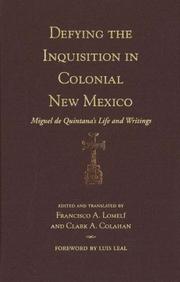| Listing 1 - 7 of 7 |
Sort by
|
Article
Abstract | Keywords | Export | Availability | Bookmark
 Loading...
Loading...Choose an application
- Reference Manager
- EndNote
- RefWorks (Direct export to RefWorks)
Book
ISBN: 9789058677082 9058677087 9461660537 9789461660534 Year: 2009 Volume: 24 Publisher: Leuven Leuven University Press
Abstract | Keywords | Export | Availability | Bookmark
 Loading...
Loading...Choose an application
- Reference Manager
- EndNote
- RefWorks (Direct export to RefWorks)
The 16th-century humanist Juan Maldonado in his Latin essays foreshadows the Spanish picaresque. Like Erasmus, with whom he corresponded,Maldonado advocated the use of Latin in a wide-range of activities. Maldonado's Pastor Bonus, a lengthy open letter to a bishop, reviews in a vivid and satirical style the abuses of the churchmen in his diocese. His ludus chartarum is framed as a colloquium similar to Vives' on the subject, entertaining while teaching a Latin terminology for card playing. His Bacchanalia, written for student actors, is a spirited play pitting the forces of Lent against those
Latin literature, Medieval and modern --- Picaresque literature, Spanish --- History and criticism. --- Maldonado, Juan, --- Maldonado, Juan --- Academic collection --- 2 MALDONATUS, JOANNES --- 2 MALDONATUS, JOANNES Godsdienst. Theologie--MALDONATUS, JOANNES --- Godsdienst. Theologie--MALDONATUS, JOANNES --- Littérature latine médiévale et moderne --- Littérature picaresque espagnole --- Histoire et critique --- History and criticism --- Maldonat, Joan, --- Criticism and interpretation --- Latin literature, Medieval and modern - History and criticism. --- Picaresque literature, Spanish - History and criticism. --- Maldonado, Juan, - ca. 1485-1554. --- Maldonado, Juan, - ca. 1485-1554. - Ludus Chartarum. --- Maldonado, Juan, - ca. 1485-1554. - Pastor Bonus. --- Maldonado, Juan, - ca. 1485-1554. - Bacchanalia.
Book
ISBN: 082633959X 0826339581 9780826339591 9780826339584 Year: 2018 Publisher: Albuquerque
Abstract | Keywords | Export | Availability | Bookmark
 Loading...
Loading...Choose an application
- Reference Manager
- EndNote
- RefWorks (Direct export to RefWorks)
The editors present Quintana's eighteenth century writings: an essay on Church and society in colonial New Mexico and a translation of Quintana's poetry and religious plays.
Digital
ISBN: 9781299438866 9783035100402 Year: 2010 Publisher: Bern Berlin Bruxelles Peter Lang
Abstract | Keywords | Export | Availability | Bookmark
 Loading...
Loading...Choose an application
- Reference Manager
- EndNote
- RefWorks (Direct export to RefWorks)
Commentary on Don Quixote is as universal as affirmations of the novel’s importance, yet until now no study has examined what Cervantes said about it. In the prologue to the first half of the work (1605) the self-conscious author, in a tongue-in-cheek dialogue with the reader and an unconventional friend, makes a good number of comments on his own book. In the opening chapters of Part 2 (1615), the same sort of witty evaluation continues with remarks by Sancho Panza, Sansón Carrasco and Don Quixote in a lively and extended conversation focused on what has been said about Part 1 since its publication and how the characters feel about those readings. The present study carefully examines and compares these and other self-reflective passages to clarify the work’s successes and failures as interpreted by a privileged reader – the author himself.
Book
ISBN: 9783034303521 Year: 2010 Publisher: Frankfurt am Main [etc.] Peter Lang
Abstract | Keywords | Export | Availability | Bookmark
 Loading...
Loading...Choose an application
- Reference Manager
- EndNote
- RefWorks (Direct export to RefWorks)
Book
ISBN: 9783487156637 3487156636 Year: 2018 Publisher: Hildesheim Georg Olms Verlag
Abstract | Keywords | Export | Availability | Bookmark
 Loading...
Loading...Choose an application
- Reference Manager
- EndNote
- RefWorks (Direct export to RefWorks)
Díaz de Luco, Juan Bernal --- Díaz de Luco, Juan Bernardo, --- Dialogues, Latin (Medieval and modern) --- Satire, Latin (Medieval and modern) --- Latin satire, Medieval and modern --- Latin wit and humor, Medieval and modern --- Latin dialogues, Medieval and modern --- Latin literature, Medieval and modern --- History and criticism --- Seneca, Lucius Annaeus, --- Erasmus, Desiderius, --- Annaeus Seneca, Lucius, --- Seneca, Annaeus, --- Seneca, --- Seneca, L. A. --- Seneca, Lucio Anneo, --- Seneka, --- Seneka, L. Annėĭ, --- Sénèque, --- סנקא, לוציוס אנאוס --- Pseudo-Seneca --- Influence. --- Seneca, Lucius Annaeus --- Seneca

ISBN: 0826339573 9780826339577 Year: 2006 Publisher: Albuquerque University of New Mexico press
Abstract | Keywords | Export | Availability | Bookmark
 Loading...
Loading...Choose an application
- Reference Manager
- EndNote
- RefWorks (Direct export to RefWorks)
| Listing 1 - 7 of 7 |
Sort by
|

 Search
Search Feedback
Feedback About UniCat
About UniCat  Help
Help News
News